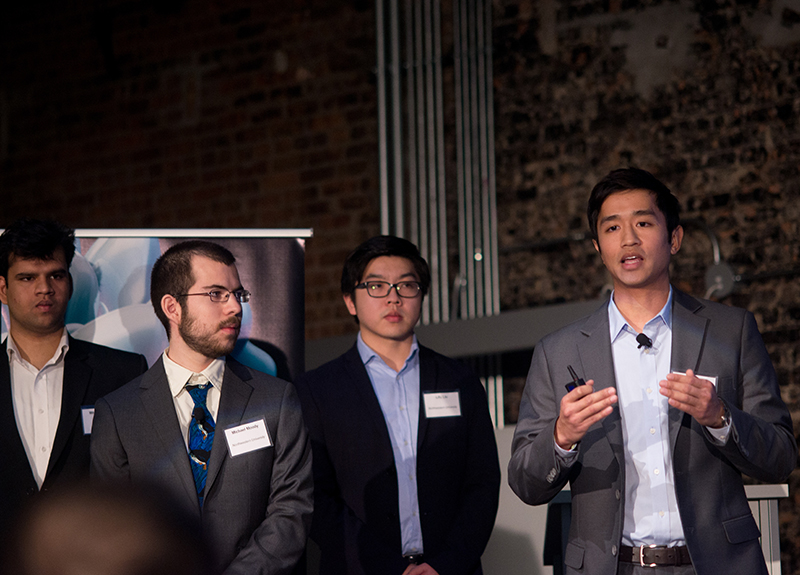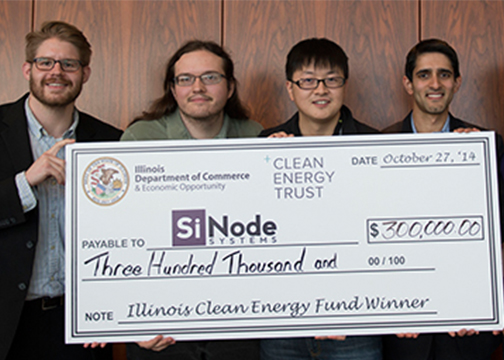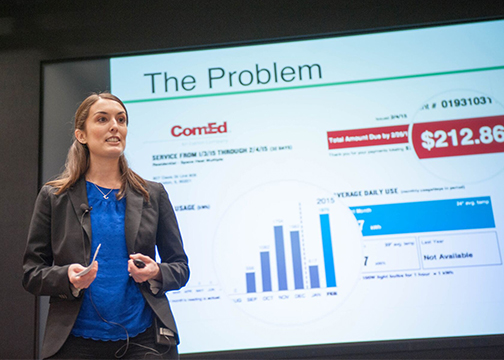Pitching to a panel of energy innovators at the 2017 Midwest CleantechUP competition was nothing new to Purpled, a Northwestern material science startup championing a compact, convenient, and cost-effective way to disinfect water.
“Today it’s simply impractical to reuse water, but with Purpled, we flip the economics, making water reuse a reality,” said Zhuang Rui “Ricky” Tan, an MBA student at the Kellogg School of Management, in the group’s pitch.
Purpled combines the disinfecting power of a photocatalyst, or a material that speeds up a chemical reaction when exposed to light (in this case, the reaction kills bacteria), with the efficiency of an LED as a power source. When integrated, the technology can clean water without the use of expensive chemicals like chlorine, and at half the cost of ultraviolet (UV) irradiation treatment. It also has an advantage over another effective method for disinfection, ozonation, or the process by which ozone is introduced into the water and rapidly reacts with, and eliminates, bacteria. Unlike ozonation, the technology proposed by Purpled does not leave behind a corrosive residual.
The startup sufficiently impressed the judging panel to secure a coveted top-three spot in the Midwest competition, advancing from an original group of eight competitors from Illinois, Michigan, Minnesota, and Ohio. Purpled will join teams from seven other CleantechUP regions at the national Department of Energy Cleantech University Prize competition in June. There, they will compete for $100,000 in prize money to apply toward their cleantech ventures.
Launched in 2015, CleantechUP builds on its predecessor, the DOE National Clean Energy Business Plan Competition, which was started in 2011 and has since highlighted participants from 200 ventures, created 120+ jobs, and raised more than $120 million in follow-on funding.
Tan and the rest of the interdisciplinary team, which includes Michael Moody, materials science, Lifu Liu, engineering management, and Mihir Bhagat, chemical and biological engineering, met and formed Purpled in NUvention: Advanced Materials, a cleantech commercialization course organized by the Farley Center for Entrepreneurship and Innovation (the Institute for Sustainability and Energy at Northwestern (ISEN) is a co-organizer of NUvention: Energy, a sister course in the series).
“NUvention allowed us to apply our various backgrounds toward assessing the viability of the technology in the real world, on an accelerated timeline,” said Moody.
Notable past NUvention: Energy projects include Sinode Systems, an advanced battery materials company, and Hazel Technologies, a food tech company with a technology that extends the shelf life of produce. Both companies competed in past years of the Midwest CleantechUP competition, with Sinode Systems going on to win the national competition in 2013. Just this past year, the company was awarded a $4 million contract from Ford, General Motors, Fiat Chrysler, and the US DOE, to develop its advanced battery technology for the electric vehicle market.
Hoping to follow in their footsteps, Purpled aims to market its technology to appliance manufacturers, namely water chillers, aquarium manufacturers, and pool managers. Next steps include securing $50,000 to run feasibility studies of the technology and from there, anf from there, raising a $1 million investment toward developing 100 customer-ready prototypes in 18 months.
The other two companies moving on from the Midwest include the first-place winner (which included a $50,000 prize), RVS Rubber Solutions from Case Western University (OH), and BluSolar from Millikin University (IL). RVS’ technology processes out the unrecyclable components from rubber in a cost-effective and environmentally friendly way, while BluSolar offers research and development services pertaining to the cryogenic treatment of photovoltaics.






